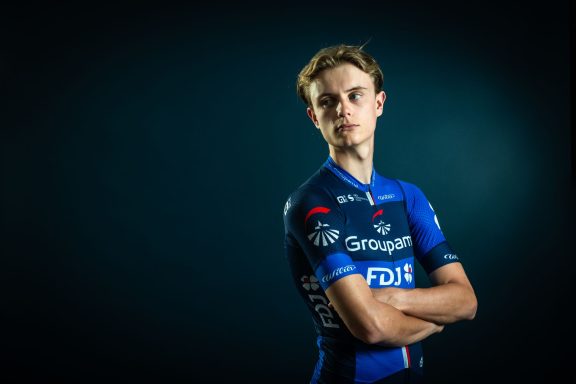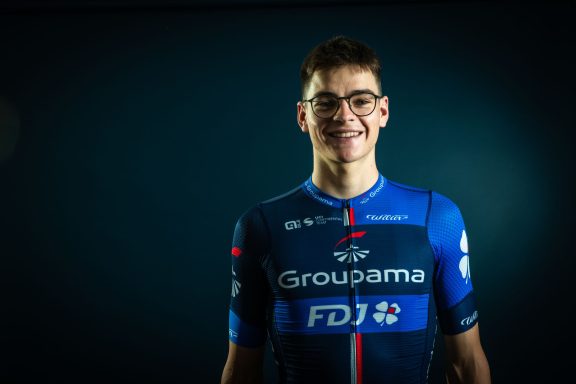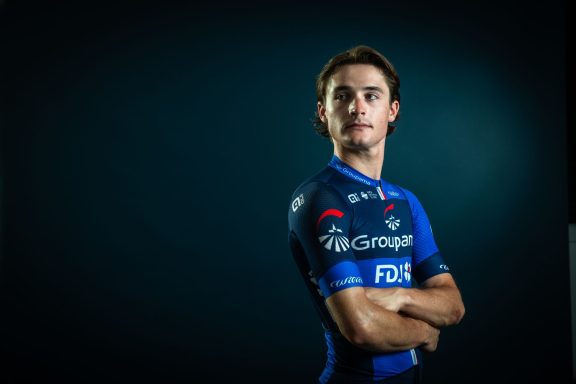Until Sylvain Moniquet joined the “Conti” this year, the Groupama-FDJ organization had not welcomed a Belgian rider to its ranks since the 2015 season. At the age of 22, the promising climber appears today, after quite a linear development, among the rising stars of Walloon cycling. This is also a young man with a healthy mind – in a healthy body – that we are about to get to know in this new feature.
It’s surely not easy to move past cycling when you come from Belgium… You actually never move past it completely. “Cycling is a true religion here, says Sylvain Moniquet, I was unconsciously immersed in it from my childhood”. Consciously, however, it isn’t the sport that first won him over. Coming from a family that was more interested in basketball, the young boy thus “followed his siblings’ example” for several years “before changing direction”. From six to thirteen, he therefore enjoyed himself on the parquet floors while his attraction to cycling grew bigger but remained unpretentious. When he goes for a ride with his friends or family in his province of Namur, it’s mostly about getting some fresh air. “I would do about thirty kilometers with my grandfather, he undoubtedly passed on his love for cycling to me,” he recalls. “We would ride slowly together. He used to take me to beautiful spots in the countryside”. Over the years, he got more and more interested in cycling himself. He soon got a new road bike to “go faster” with his friends, but also to “look classier,” he admits smiling. In addition to the passion he already had, he now possessed the right equipment, and all he needed was a small stimulus to go for it and leave the basketball courts aside. “I would often see a team training in my village every Wednesday after school,” he explains. “I thought it might be nice to go with them, to ride in a group, that it would be good both for safety and for fun. I did two or three training sessions with them and then bought a bike.”
“Cycling was not meant to take that much space in my life”
At 15, he signs his very first cycling permit at SCV Marchovelette without having “necessarily the desire to do races”. This won’t last long, even if his first steps are obviously complicated. “At first I was often dropped,” he recalls. “I sometimes even cried in the team car during training because I couldn’t do any more after 30 kilometers, or because it was going up too much”. Still a newbie to the sport, he continues working on his technical skills while waiting for his physical abilities to increase. “Slowly, I felt better and better,” he continues. “I noticed that by dint of riding, I was starting to get to their level, even if I was still among the weakest riders on the team in my first year”. He has to wait until the following season to pass a real milestone and finally catch up on the delay accumulated by the years he was more interested in getting to the hoop than to the finish line. His progress becomes brilliantly noticeable on the Tour de l’Ain Cadets. “I won two of the four stages there, whereas I had been dropped almost every day in my first year”. He also wins the Tour de la Basse-Meuse, “a hilly event that’s very famous in Belgium”. All that without a very sophisticated training plan. “I liked what I was doing, so I just rode a little more, three or four times a week. But it really was for fun. I was doing longer and longer rides and that’s what gave me a better level. I also noticed that I was doing pretty well in the hills, so I was going to work on it further south from home.” Nonetheless, his results come as a “pleasant surprise”, and also as a trigger for a new stage in his cycling process.
“I was getting better mentally and physically, and I was aiming higher and higher as a esult,” says Sylvain. “I was looking for a strong junior team and I had the chance to join one. I wouldn’t be where I am today without it.” At CC Chevigny, he first takes his marks in his new category and takes advantage of the opportunity to compete in international, hilly events. He mostly gets noticed in his second junior year with an 11th place on the Ain’Ternational-Rhône Alpes-Valromey Tour and a sixth place on the Giro di Basilicata. In addition, he gets two victories at the regional level and the DH Challenge Philippe Gilbert consistency prize. “I was able to stand out, even if I was still reasonable in training in terms of hours and workloads, because we didn’t want it to become a constraint. It had to remain a pleasure and it was not meant to take that much space in my life”, he insists. However, this quite full second year among the juniors proves to be a turning point. “I had a proposal to join the best team in Wallonia in my first year U23, and I thought it may mean that I had qualities”. It is only when he joins the Wallonie-Bruxelles development team that he starts to think about a future at the pro level, and on the mother team in particular. “Before that, I had never thought of making my life out of it, even if everyone has this dream of going pro in the back of their mind growing up”, he claims. “I just told myself that I was going to continue on my own way, I didn’t want to bother myself too much with that”.
Stepping up within the U23
Calm and modest by nature, the young Belgian still had refused to build castles in the air up to that point. Especially that he wouldn’t achieve high performance immediately upon entering the U23 ranks. “Until the Tour de Namur, I would be dead in the water,” he admits. “I would hardly finish the races, but I would finish them. It wasn’t great but it wasn’t going so bad still”. Eventually, it’s on his home roads that he manages to step up his game. He gets second in the Grand Prix Lekeu-Verviers and in a stage of the Tour de Namur. He therefore gains confidence, but also credibility amongst his team, who decides to extend his stay to the 2018 season along with giving him more responsibilities. “They noticed that I had the abilities to climb and be with the best in the hills,” he adds. That pays off as early as the following April on the Tour du Jura, where he closes in fourth position. This performance “expand his CV” and opens the doors of the Belgian national team to him. “I am grateful for these opportunities because they are wonderful experiences,” he swears. “It’s pure joy, really. I think these are the best races because all the best in the world come together, on atypical courses like in the Course de la Paix”. He actually takes a decent twentieth position in the Czech race won by Tadej Pogacar. “Without really breaking the house down”, Sylvain Moniquet thus continues making constant progress at the dawn of his third year as U23, where he clearly confirms his potential. He then wins a stage and the overall of the Triptyque Ardennais, “a very coveted Tour in Belgium by the U25 riders”, returns strongly in the Course de la Paix (6th overall) and comes close to the podium in the Tour de Liège. The Tour de l’Avenir is then waiting for him.
He arrives as a lieutenant for his fellow companions Mauri Vansevenant and Ilan van Wilder, and perfectly fulfils this role during the seventh stage, towards La Giettaz, being an invaluable asset to Vansevenant’s taking up the yellow jersey. Icing on the cake, he finishes fourth in the stage and climbs to tenth overall. He then loses a couple of places before entering the tenth and final stage, which he’s quickly forced to abandon. “We were starting in downhill and I had a pretty spectacular crash. I fell into a ravine and I don’t remember much, he says. When I regained consciousness, everyone had already passed by. I was kind of lucky as I had nothing serious, but it was of course a big disappointment because a top 10 on the Tour de l’Avenir would have been magnificent”. Not the kind to feel sorry for himself, Moniquet gets back in the saddle and stands out at the end of the season. By attacking in the final kilometers of the Grand Prix de Wallonie (24th at the end), by netting a podium on the Tour de Moselle and by being in the mix for a top 10 on the Tour of Lombardy. “I moved up a notch”, he says. Above all, he manages to find his place in the Belgian cycling landscape. “It’s very complicated to enter the national team, because there are really a lot of requests and a very high level,” he analyses. “From a very young age, there is a lot of competition between us. When I think about it, it’s actually crazy. We almost don’t say hello to each other. We always wanted to be in front of each other and this is also what made us train more. It was a source of motivation in the end. Of course, this rivalry tends to decrease over the years, to become healthier. As we get selected together, we become friends”. Under the Belgian jersey, however, he mainly rubbed shoulders with Flemish riders, therefore sadly admitting that “cycling is a bit on a road to ruin in Wallonia” and that “far fewer brands now want to invest in teams”.
“As long as the road goes up, I’m happy”
Even the aura and longevity of his idol Philippe Gilbert doesn’t seem to be able to help the situation. Speaking of which, he shares an affection of the Ardennes hills with his role model, though their profiles take different paths outside of this, with Moniquet being closer to a climber, something quite rare in the ‘flat country’. “The region I live in certainly influenced my profile a lot,” he explains. “Morphologically, I am also quite a light rider. I’m always around 60 kilos, it’s not a weight to be a Flandrien or to win sprints. And fighting for position isn’t my thing; nervous racing isn’t for me really. All of this means that I headed for hills and mountains without realizing it”. At 22 years old, unlike some of his teammates who just come out of the junior ranks, the Walloon therefore has a pretty clear idea of the rider he’s able to become: “I like climbs of 10-15 kilometers, maximum, and shorter ones like in the Ardennes. Those of 2-3 kilometers are my favourite field. I like races where the selection is made over time, with wear and tear, and this is generally what happens in the Ardennes or in the mountains. Actually, I’m not demanding: as long as the road goes up, I’m happy”. Among the pros, taking part in Liège-Bastogne-Liège would be his “greatest dream”, but passing just five kilometers from his home with the Flèche Wallonne bunch would be just as “magnificent”. As for stage races, he admits that he has to work on his “versatility” even if the time trial does not seem to be a hurdle. “I’m not doing too bad,” he confirms. “I’ve never really trained on a TT bike, and in spite of this, I’ve already had some good performances and I think I can still improve. I like to ride hard for a long time and to push beyond my limits. Time trials are getting more and more important on stage races and I think I’m able not to lose too much time, I could even gain some.”
With his idol Philippe Gilbert, he now also shares a path, having joined the Marc Madiot’s organization just like his illustrious fellow countryman eighteen years ago. “Jens [Blatter] came to me after the Tour de l’Avenir to ask me if I wanted to join the Conti for my last year as U23,” said Sylvain. He then had what we call “a good problem to have”, as he also had two offers from continental professional teams on the table. Consequently, choosing Groupama-FDJ development team was a bit of a risk, he admits. “It was not an easy choice at all, I thought about it for several weeks,” he says. “I first assessed whether I was ready to move into the top level or whether I could stay an additional year in U23 and try to win great races. But I mainly chose the ‘Conti’ to try to aim for the WorldTour afterwards. I told myself – it was obviously before the coronavirus – that there were great races to be won at the start of the season, great things to do on Valle d’Aosta, the Baby Giro, the Tour de l’Avenir… I told myself that if I’d shine in these kinds of races, I would automatically get a contract in the WorldTour. Despite the current situation, I do not regret my choice. And then, also having my studies on the side, I told myself ‘aim high, we’ll see then’.” Cycling not being, indeed, his only activity. “Before, I would even put it slightly aside because I was on a team that was a bit less professional, where I had less pressure. Since I joined Groupama-FDJ, I’m trying to focus more on cycling even if I keep my studies as a Plan B in the back of my mind. Because you never know.”
Cycling, but not only that
Thanks to this educational background, he’s able to look at his situation today with more distance than others. A student at the University of Louvain, the largest in the Walloon region, he has been pursuing a management engineering degree for three years now and has never considered interrupting his “two fronts” life despite obvious difficulties. “It is not easy doing both, you have to find a happy medium,” he explains. “I always wanted to continue my studies and I always knew how to motivate myself. In fact, everything is a matter of organization and motivation. When you are organized and motivated, you can do many, many things. Obviously it is sometimes more complicated, especially before exams, when you have to study 8 hours a day and then have to train even if you are tired”. He however found his personal balance in this way of living. “Just riding a bike is not enough for me,” he says. “I don’t like to go training and do nothing in the afternoon. I always need to be busy. Studying also enables me to take my mind off something, without losing my level on the bike. And so far, everything has gone very well.” Without a doubt, his priority today is his career, but his course off the bike helps him to put into perspective the problems related to pro cycling. “I am 100% involved in cycling and I will do everything to go WorldTour, and make a living of it,” he insists. “But being able to tell myself that I will have another option if one day I don’t find my place anymore, it makes me calmer. I may be more relaxed than others who will put much more pressure on themselves, which could affect their performance. Once I get my ‘Bac’ (+3 after highschool), I’ll see where I stand in terms of cycling. I will then decide whether or not to put my studies in parentheses. If I have a good contract, this is what I will do. If I don’t move forward, or if I go backwards, I will try to pursue them. But I hope it will keep going the good way.”




No comment